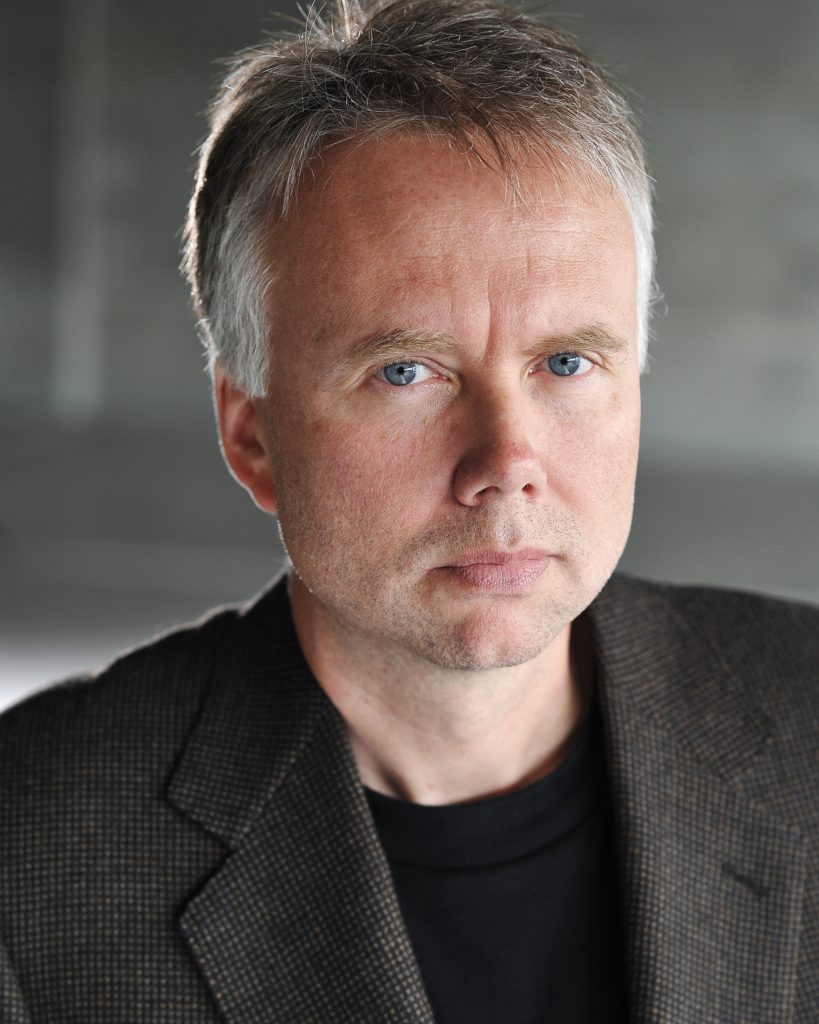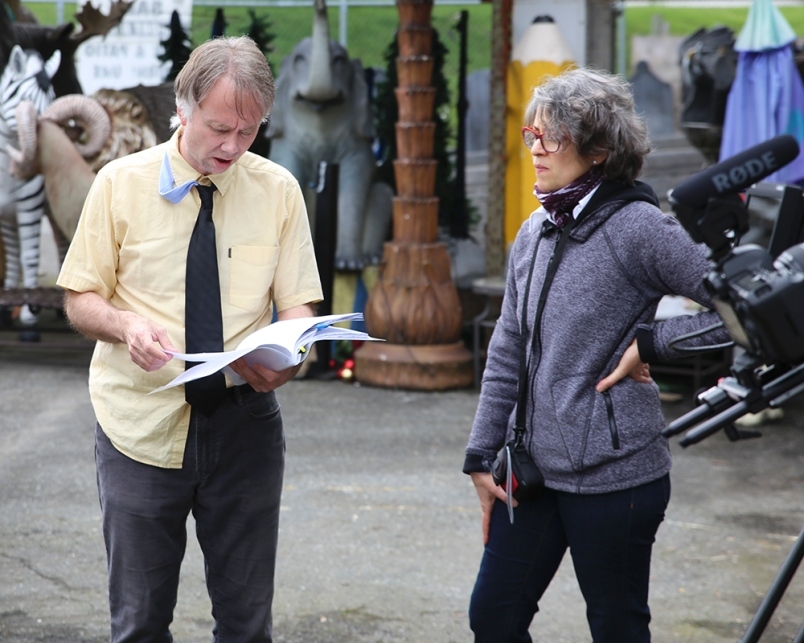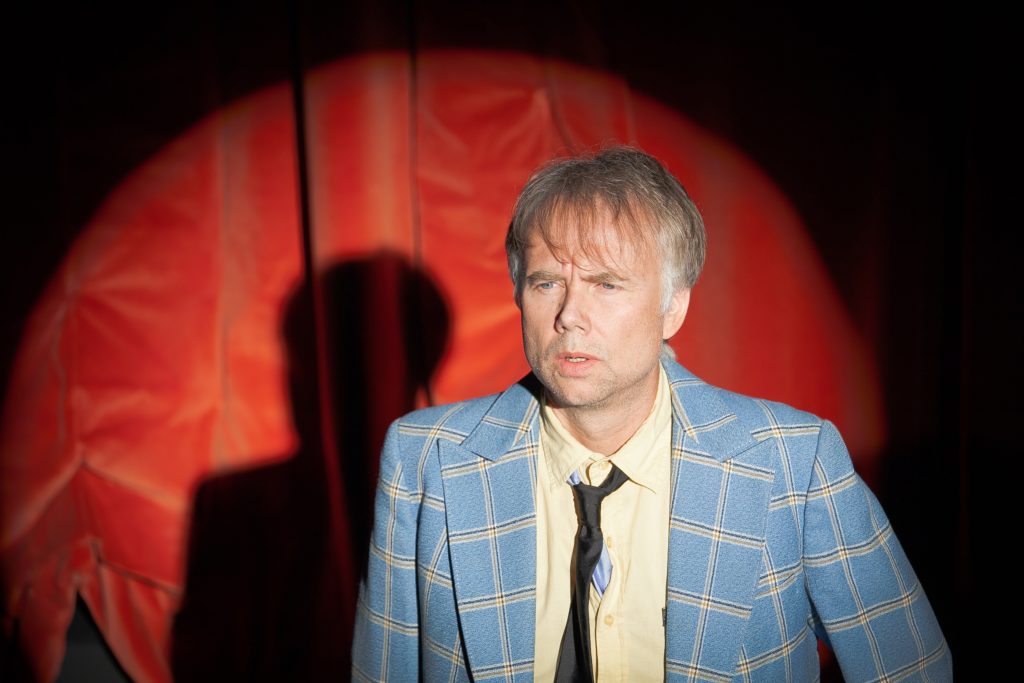In my ongoing crusade to highlight independent filmmakers, I sometimes uncover a gem that essentially doubles my interest. Meet Ross Munro, who works closely with his wife Maria (she will be featured later this week). A little while back, Ross agreed to an interview in which we briefly examined his work thus far, his motivation behind his filmmaking passion, and his future endeavors.
RH: Why did you decide to become an actor?
RM: I think just because I grew up in the ’70’s. I was just one of those movie rats that always went to movie theaters. All my daydreaming was about actors. I loved Charles Bronson and Clint Eastwood and all those other action guys. I loved the classics too, like Paul Newman and Steve McQueen. I had two fantasies. One was to see myself as a rock and roll star, and the other, as an actor.
What kind of training have you received in acting/filmmaking?
As far as filmmaking goes, I actually graduated from a film production program in the 80’s in Toronto. In this program, I learned the nuts and bolts of filmmaking. It was pretty comprehensive and very hands-on with the equipment, which is what I really wanted. I didn’t really want so much the philosophical and critical study of films. I knew I wanted to get my hands on extensive film equipment. So, I was trained formally there.
With the acting, I studied here in Vancouver. There’s a lot a excellent acting programs, so I studied with two different teachers, two different scene study classes. That’s how I met some of the actors who are in Legacy of Whining.
I know sometimes I talk with actors and filmmakers who have had no formal training whatsoever, and I wonder how on earth they are able to do that.
Yeah, you’re right, that does happen sometimes. What I’ve learned about filmmaking is there are so many different approaches to it. You have someone like Quentin Terantino who loves movies and works at a video store and has this encyclopedia knowledge about everything having to do wtih movies. He can actually create his own vision for his movies ’cause he’s cut his teeth on all the really great movies and has studied them. Then you have someone like Woody Allen who comes from a background of stand-up comedy and he just gets involved in making movies. I am always interested in the backstory of filmmakers so I can see where they come from and what their approach is. Here in Vancouver, we have the Vancouver Film School, which is huge. Lots of filmmakers have gone through their program.
Why did you choose to go the route of independent films?
I think when I got out of film school, I realized that if I really wanted to transfer my ideas and vision to film and do it in a relatively timely manner, I had to take matters into my own hands and take the independent route. I think I found the value early on of being my own content creator. I would take things I have created such as scripts, and I would take them places where they might have the potential for funding. Those are things you put in motion, but you don’t want to totally rely on that because they get a lot of competition, and you don’t know if you’re going to get that funding. So I developed that independent way of thinking where at the end of the day, if I can transfer my own vision and create my own content as both a filmmaker and an actor, then you’re not fully dependent on outside funding. You gain that self-direction and knowing that you can actually move forward by yourself with your own content.
I hear that a lot from filmmakers. They will tell me that if you go to the big studios and sell your works, you lose that creative control. It becomes theirs, and they can do with it what they want, and it doesn’t even feel like it’s yours any more.
You know, you’re right about that. Even though it’s hard sometimes to do things yourself financially and to put the time in, the one huge benefit is that complete control you have over what you’re doing. You don’t have a lot of chefs in the kitchen nor a lot of people where you have to justify everything you do. I think that definitely is a benefit to do it yourself–DIY filmmaking.
So as I looked through your works that are listed, I think Broken Palace is one of your first things listed.
Broken Palace is a short documentary that we made a couple years ago about the unfortunate, but universal issue of single-screen heritage movie theaters being torn down. That is something that has been going on since around the 70’s or so, but really noticeable now, especially here in Vancouver with real estate prices and the move to all these multi-screen cinemas. That actually played at the Vancouver Film Festival. So we were happy with that. And that was the first film I made with my wife, Maria. It was a huge benefit that we were able to work together.
I see that trend a lot in independent films–couples working together or at least family members working together. I know you had a couple of things before this one.
The main thing I did was a feature film called Brewster McGee, which I wrote and directed. We showed that film all over–in Vancouver, Winnipeg, Toronto, Seattle, Portland, Los Angeles. So I followed that film around and did Q & A’s. Even though my wife didn’t work on the production of that film, she oversaw the production of our DVD and all our marketing materials, posters, and such. She’s originally a graphic designer. It’s amazing having an in-house person who can come up with all the amazing posters and websites and postcards. That is the main thing I have done prior to Broken Palace and The Legacy of Whining.
Is Broken Palace available for people to watch?
We have an American and international distributor for A Legacy of Whining. We are planning to put Broken Palace on Vimeo or some online streaming service. It is a short, and we just really want to get it up there, and as far as we’re concerned, anybody can come and look at the film. It’s a six-minute movie, so we really just want to get it out there. Traditional or independent movie theaters can watch it then and just enjoy it or drive traffic to the website. It can be used a public service announcement just to remind people of the sanctity and enjoyment of all these old-fashioned movie theaters. We really don’t care if we make any money off of it. We just really want to get it out there and spread the gospel.
Since Legacy of Whining is your current work, let’s really focus on that. What was your inspiration for writing Legacy of Whining?
The big thing for me was that I grew up watching films in the ’70’s. I was really a big fan of that genre of buddy movies. Of course, they still make them. They never stopped making them. The Nice Guys with Russell Crowe and Ryan Gosling. I grew up watching Butch Cassidy and the Sundance Kid, The Sting, and all these buddy-type films. We tried to pay homage to those films in the making of this film. Since I was around fifty years old when we made and wrote that film, I wanted it to be a buddy film, but I also wanted it to feature a male mid-life crisis breakdown. I thought we could combine the desperation and the seriousness of the undercurrents of going through a mid-life crisis, sort of an identity crisis. I wanted people to be able to look at the film and be able to relate to it. You don’t even have to be fifty years old. You could be twenty-five years old and going through that identity crisis and wondering what you were going to do with your life. I wanted to make it universal and not just this idea where if I’m not a fifty-year-old guy, I’m not gonna understand this. I wanted it to be relatable to anyone who was questioning who they were, their time and place, who are they and what they can become, and what directions they need to move into.
How long did it take you to write the film?
Probably to write the film, close to six months. What I do is gather a lot of ideas and write down notes about characters and the story. Once I shape all that and feel like I have a good blueprint, I formally write the screenplay. Once it’s done, I do some rewriting and editing and try to improve it. So that whole process takes about six months.
How did you go about casting this film?
We looked at different local films and different actors around the area. And of course, sometimes we had specific things we would look for physically or age-wise. We also went to different talent agencies and casting directors and said, “This is what we’re looking for. Do you have anybody in mind?” We had a really good pool of local talent that was being offered to us through formal talent agencies. And through my experiences studying acting, I was able to find a few people as well. So we just built from that from the ground up. All our casting is from that local pool of actors that we found through various methods. My wife, Maria, did a great job, too. She looked for lots of people and did a lot of interviewing. She really scoped things out and called some great people. She was the producer as well as the costume designer.
I think it’s great that you were able to use local talent, especially since some of these people often get overlooked by bigger studios, so this was a way to give them some film experience.
I think so too. It was also beneficial since we shot the film over several months–which was really odd since the movie only takes place in one evening. I meet my friend at the airport, and I haven’t seen him in over thirty years. Then something goes wrong, and the movie just keeps moving forward until the sun comes up the next day. That’s the whole experience. On a functional level, we realized that we needed local people. For instance, if we used them, we we might need them two or three months later. If we have all these actors here, we could call them up after a couple months and say, “Okay, make sure you get your hair looking the way it was when we were filming last time.” Because the whole film takes place in one evening, so everyone has to look the same. That was hard for me over several months because I had to make sure that I shaved the same way or my hair had to be the same. I had to make sure I didn’t lose any parts of my outfit. I couldn’t even go out hiking and stuff like that ’cause I thought, “If I get a sunburn or something like that, that’s gonna wreck my look and the continuity of the look.” So it was challenging.
I can imagine. I wouldn’t have initially thought of all those things. {pause} So this film has been running the film festival circuit?
We were at a film festival this summer just outside of Toronto in Oakville. We’ve screened it a couple times in Vancouver. And there are a few more screenings still to come. But the big thing is that we have launched the film in North America on digital formats. In the United States, on Amazon. In Canada, on Google Play. We’re really big on promoting that. With our distributor, we’re working on international sales as well, but mainly the digital level is the best way to get our film out to the masses, right?
Yes, I do remember seeing that it was on Amazon Instant Video. So that means I can direct people towards the sites if they are interested in seeing it.
It’s great ’cause it’s almost a democratized system of watching movies. We could rent a theater and figure out how to get an audience there, but now with the press of a button–and it’s only $2.99–we joke about it on our website, “You can’t buy a latte for $2.99. Now you can actually watch a movie.” It’s really cost-effective. It’s not that you worry about charging a lot. It’s offering it at a really good price. You can get more people. You really just want people to see your movie as much as possible.
In addition to this, do you have any other upcoming works you can mention?
My wife and I have a couple different feature projects that we’ve developed. We hope to get those into production in 2017. One is a modern urban romance. Another is about a small town rock and roll band in the late ’50’s. We’ve got a lot of different things that we’re working on and that we’re really excited about. My wife and I always have things going, and we’re always working on projects.
I think that’s what you have to do, especially in independent films. If you’re the one who is doing all of this, you are the one who has to have the next big thing ready to go. You don’t want to take several months off. You want to keep building the momentum.
Absolutely. You’ve got to keep it moving. The goal is–and we’re sort of in that goal–to have a film that you’re developing. At the same time, have a film like Legacy of Whining that’s done and you’re working on the marketing. Then you’re also working on pre-production on another project. That’s the ultimate goal to have all three of those things being juggled at the same time. So you always have different films at different production levels, so that you’re not just starting from scratch all the time. You’ve got momentum going with several things at the same time.
Twitter: twitter.com/rossbrew
IMDB: www.imdb.com/name/nm1646032/
Website: www.nextoneproductions.ca
FOLLOW/SUPPORT ROSS’ FILMS
A Legacy of Whining
Facebook: www.facebook.com/ nextoneproductions
Trailer: https://www.youtube.com/watch?v=AnEUlrPdfxg
YouTube Channel: www.youtube.com/channel/
Trailer Snotty Punks: https://www.youtube.com/watch?v=2UTAt6iM8xk
A LEGACY OF WHINING now available in CANADA, US, UK & Australia
FREE on Amazon Prime or rent/buy on Amazon https://goo.gl/xCXXvu
Brewster McGee
IMDB: http://www.imdb.com/title/tt0415683/?ref_=nm_knf_t3
Facebook: https://www.facebook.com/Brewster-McGee-148057945208005/





